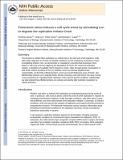Proteotoxic Stress Induces a Cell-Cycle Arrest by Stimulating Lon to Degrade the Replication Initiator DnaA
Author(s)
Liu, Jing; Jonas, Kristina; Laub, Michael T; Chien, Peter, 1976-
DownloadLaub_Proteotoxic stress.pdf (5.442Mb)
PUBLISHER_CC
Publisher with Creative Commons License
Creative Commons Attribution
Terms of use
Metadata
Show full item recordAbstract
The decision to initiate DNA replication is a critical step in the cell cycle of all organisms. Cells often delay replication in the face of stressful conditions, but the underlying mechanisms remain incompletely defined. Here, we demonstrate in Caulobacter crescentus that proteotoxic stress induces a cell-cycle arrest by triggering the degradation of DnaA, the conserved replication initiator. A depletion of available Hsp70 chaperone, DnaK, either through genetic manipulation or heat shock, induces synthesis of the Lon protease, which can directly degrade DnaA. Unexpectedly, we find that unfolded proteins, which accumulate following a loss of DnaK, also allosterically activate Lon to degrade DnaA, thereby ensuring a cell-cycle arrest. Our work reveals a mechanism for regulating DNA replication under adverse growth conditions. Additionally, our data indicate that unfolded proteins can actively and directly alter substrate recognition by cellular proteases.
Date issued
2013-08Department
Howard Hughes Medical Institute; Massachusetts Institute of Technology. Department of BiologyJournal
Cell
Publisher
Elsevier
Citation
Jonas, Kristina et al. “Proteotoxic Stress Induces a Cell-Cycle Arrest by Stimulating Lon to Degrade the Replication Initiator DnaA.” Cell 154.3 (2013): 623–636.
Version: Author's final manuscript
ISSN
0092-8674
1097-4172